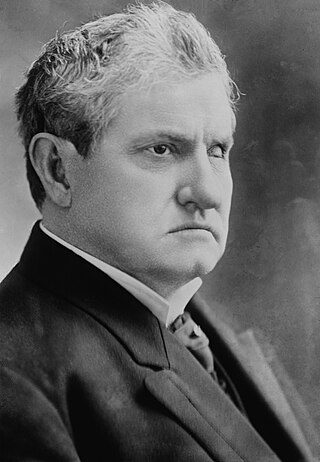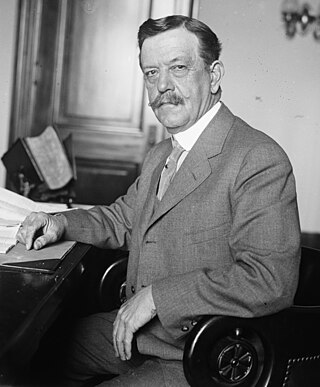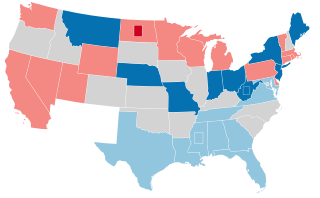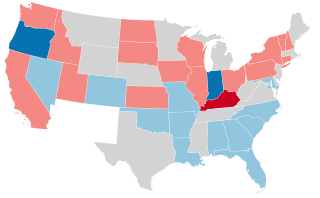
Benjamin Ryan Tillman was a politician of the Democratic Party who served as governor of South Carolina from 1890 to 1894, and as a United States Senator from 1895 until his death in 1918. A white supremacist who opposed civil rights for black Americans, Tillman led a paramilitary group of Red Shirts during South Carolina's violent 1876 election. On the floor of the U.S. Senate, he defended lynching, and frequently ridiculed black Americans in his speeches, boasting of having helped kill them during that campaign.

Ellison DuRant “Cotton Ed” Smith was a Democratic Party politician from the U.S. state of South Carolina widely known for his virulently racist and segregationist views and his advocacy of white supremacy. He represented South Carolina in the United States Senate from 1909 until 1944.

The 1912–13 United States Senate elections were held on various dates in various states. They were the last U.S. Senate elections before the ratification of the Seventeenth Amendment in 1913, establishing direct elections for all Senate seats. Senators had been primarily chosen by state legislatures. Senators were elected over a wide range of time throughout 1912 and 1913, and a seat may have been filled months late or remained vacant due to legislative deadlock. Some states elected their senators directly even before passage of Seventeenth Amendment. Oregon pioneered direct election and experimented with different measures over several years until it succeeded in 1907. Soon after, Nebraska followed suit and laid the foundation for other states to adopt measures reflecting the people's will. By 1912, as many as 29 states elected senators either as nominees of their party's primary or in conjunction with a general election.

The 1910–11 United States Senate election were held on various dates in various states. As these U.S. Senate elections were prior to the ratification of the Seventeenth Amendment in 1913, senators were primarily chosen by state legislatures. Senators were elected over a wide range of time throughout 1910 and 1911, and a seat may have been filled months late or remained vacant due to legislative deadlock. However, some states had already begun direct elections during this time. Oregon pioneered direct election and experimented with different measures over several years until it succeeded in 1907. Soon after, Nebraska followed suit and laid the foundation for other states to adopt measures reflecting the people's will. By 1912, as many as 29 states elected senators either as nominees of their party's primary or in conjunction with a general election.

The 1908–09 United States Senate elections were held on various dates in various states. As these U.S. Senate elections were prior to the ratification of the Seventeenth Amendment in 1913, senators were primarily chosen by state legislatures. Senators were elected over a wide range of time throughout 1906 and 1907, and a seat may have been filled months late or remained vacant due to legislative deadlock. However, some states had already begun direct elections during this time. Oregon pioneered direct election and experimented with different measures over several years until it succeeded in 1907. Soon after, Nebraska followed suit and laid the foundation for other states to adopt measures reflecting the people's will. By 1912, as many as 29 states elected senators either as nominees of their party's primary or in conjunction with a general election.

Frank Boyd Gary was a United States senator from South Carolina. Born in Cokesbury, South Carolina, he attended the Cokesbury Conference School and Union College. He studied law, was admitted to the bar and commenced practice in Abbeville, South Carolina in 1881. From 1890 to 1900 he was a member of the South Carolina House of Representatives, serving as speaker from 1895 to 1900. He was a delegate to the State constitutional convention in 1895 and was a member of the State house of representatives in 1906.

The 1944 South Carolina United States Senate election was held on November 7, 1944 to select the U.S. Senator from the state of South Carolina.

The 1938 South Carolina United States Senate election was held on November 8, 1938, to select the U.S. Senator from the state of South Carolina. Incumbent Democratic Senator Ellison D. Smith defeated Governor Olin D. Johnston in the Democratic primary. The general election was contested, but a victory by Smith was never in doubt.

The 1914 United States Senate election in South Carolina was held on November 3, 1914 to select the U.S. Senator from the state of South Carolina. It was the first election in South Carolina in which the voters were able to choose the candidate in the general election. Incumbent Democratic Senator Ellison D. Smith won the Democratic primary and defeated nominal opposition in the general election to win another six-year term.

The 1920 South Carolina United States Senate election was held on November 2, 1920 to select the U.S. Senator from the state of South Carolina. Incumbent Democratic Senator Ellison D. Smith won the Democratic primary and was unopposed in the general election to win another six-year term.

The 1926 South Carolina United States Senate election was held on November 2, 1926, to select the U.S. Senator from the state of South Carolina. Incumbent Democratic Senator Ellison D. Smith won the Democratic primary and was unopposed in the general election to win another six-year term.

The 1932 United States Senate election in South Carolina was held on November 8.

The 1918 South Carolina United States Senate election was held on Tuesday, November 5, simultaneously with the special senate election to elect the United States Senator for a six-year term from South Carolina. Nathaniel B. Dial won the Democratic primary and was unopposed in the general election to win the six-year term to the Senate.

The 1913 South Carolina United States Senate election was held on January 28, 1913, when the South Carolina legislature met and unanimously ratified the results of the August 27, 1912 primary. Incumbent Senator Ben Tillman was re-elected to a fourth term in office.

The 1897 South Carolina United States Senate election was a unanimous election of the Democratic nominee on January 26, 1897 to select the U.S. Senator from the state of South Carolina. The Democratic primary election was held on August 26, 1896 and September 9. Prior to the ratification of the 17th Amendment to the United States Constitution, U.S. Senators were elected by the state legislature and not through the direct election by the people of the state. However, the Democratic Party of South Carolina organized primary elections for the U.S. Senate beginning in 1896 and the General Assembly would confirm the choice of the Democratic voters. Conservative Democratic Joseph H. Earle won the Democratic primary and was elected by the General Assembly for a six-year term.

The 1903 South Carolina United States Senate election, held January 27, 1903 to select the U.S. senator from the state of South Carolina, was predetermined by the Democratic Party primary election held on August 26, 1902, and September 9. Democrats were so overwhelmingly dominant that their nomination was tantamount to the general election.

The 1896–97 United States Senate elections were held on various dates in various states. As these U.S. Senate elections were prior to the ratification of the Seventeenth Amendment in 1913, senators were chosen by state legislatures. Senators were elected over a wide range of time throughout 1896 and 1897, and a seat may have been filled months late or remained vacant due to legislative deadlock. In these elections, terms were up for the senators in Class 3.

The 1900–01 United States Senate elections were held on various dates in various states, coinciding with President William McKinley's re-election as well as the 1900 House of Representatives elections. As these U.S. Senate elections were prior to the ratification of the Seventeenth Amendment in 1913, senators were chosen by state legislatures. Senators were elected over a wide range of time throughout 1900 and 1901, and a seat may have been filled months late or remained vacant due to legislative deadlock. In these elections, terms were up for the senators in Class 2.

The 1906–07 United States Senate elections were held on various dates in various states. As these U.S. Senate elections were prior to the ratification of the Seventeenth Amendment in 1913, senators were chosen by state legislatures. Senators were elected over a wide range of time throughout 1906 and 1907, and a seat may have been filled months late or remained vacant due to legislative deadlock. In these elections, terms were up for the senators in Class 2.

Two United States Senate elections were held in Illinois on March 26, 1913. The two elections were interconnected through a compromise made to elect a Democrat in the regular election and a Republican in the special election.













